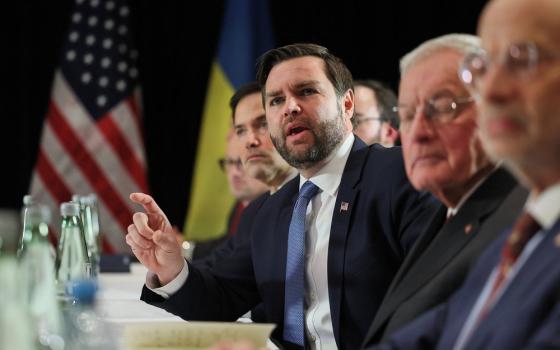
Archbishop Paul Coakley of Oklahoma City, ecclesiastical adviser to the Napa Institute, carries the monstrance during a eucharistic procession through Midtown Manhattan in New York City Oct. 15. A few thousand worshippers packed St. Patrick's Cathedral for Holy Hour and Mass before participating in the procession. (OSV News/Gregory A. Shemitz)
Far from its bucolic California wine country namesake, a Napa Institute-sponsored Mass packed St. Patrick's Cathedral in New York City Oct. 15 with more than 3,000 worshipers.
The congregation filled the massive structure on a Tuesday fall afternoon, with worshipers in the aisles kneeling in eucharistic adoration and later processing through the Midtown streets. A television screening of the events accommodated the overflow crowd outside.
Napa, known for its mix of culture war rhetoric, support of free markets, and its roster of wealthy benefactors, held the procession in collaboration with the Hallow prayer app. It was a highlight of Napa's week of business seminars in the city focusing on faith and capitalism, including a $750-per-ticket Leadership Gala co-sponsored by the Catholic University of America, an institution in Washington, D.C.
The event at St. Patrick's was largely apolitical and focused on the traditional Catholic piety of eucharistic adoration. Attendees included a vast ethnic and age mix intent on sending a message through the Gotham skyscraper canyons and Theater District.
"We will walk with Jesus Christ in the streets," said Tim Busch, Napa founder and chairman.
Advertisement
Busch said that fervent prayer was needed for a country and city in distress just weeks before a contentious election. In the only overtly political reference at the ceremony, he urged the defeat of New York state's Proposition 1, a provision that the bishops have said would enshrine abortion rights into the state's constitution.
It was the fourth year for the event, which began with a handful of participants who gathered in an empty cathedral at the height of COVID-19 restrictions in 2020. Participants said they heard about it largely via social media. The celebrant was Archbishop Paul Coakley of Oklahoma City.
The after-Mass procession, in which attendees followed the Blessed Sacrament, snarled Midtown traffic during rush hour. Passing commuters largely ignored the procession, although some stopped to take pictures. It was led by women religious in full habits, including the Sisters of Life and the Missionaries of Charity, followed by seminarians, bishops and priests, and a few thousand laypeople.

Religious sisters participate in a eucharistic procession through Midtown Manhattan in New York City Oct. 15. (OSV News/Gregory A. Shemitz)
It began under the billboard of a Victoria's Secret ad across from the cathedral and proceeded past Radio City Music Hall to Seventh Avenue, before returning to the cathedral for benediction, led by Cardinal Timothy Dolan of New York.
The homilist at the Mass was Msgr. James Shea, president of the University of Mary in Bismarck, North Dakota.
"We have an argument with God and we should put that to an end," said Shea, who called upon participants to take their Catholic faith seriously. His homily was laced with references to a world awash in temptations, with only a belief in the Eucharist as a means to quiet the stirrings of the human heart.
He quoted from St. Teresa of Ávila, the Spanish medieval mystic whose feast was celebrated that day; British Catholic author J.R.R. Tolkien; and Isaac Jogues, a 17th-century Jesuit martyr and the first Catholic priest to visit Manhattan, then the Dutch settlement of New Amsterdam.

Msgr. James Shea, president of the University of Mary in Bismarck, N.D., delivers his homily during Mass at St. Patrick's Cathedral in New York City Oct. 15. (OSV News photo/Gregory A. Shemitz)
"We live our lives in a band of mediocrity," said Shea, arguing that only a deep faith could address the evil in the world, which is evident, he said, in the marketplace and cultural capital that composes New York.
Participants in a random sampling agreed with Shea that only through intense eucharistic adoration could the city and country be rescued from its ills.
As the strains of Panis Angelicus filled the streets outside the cathedral, Toni Stabile of Greenwich, Connecticut, said she came to the event after hearing about it on Catholic radio.
"Catholics are being persecuted," she said, blaming liberal-minded politicians for what she described as an anti-Catholic agenda.

Worshippers participate in a eucharistic procession through Midtown Manhattan in New York City Oct. 15. (OSV News/Gregory A. Shemitz)
Vannesa Balecha came from her home in Bend, Oregon. A former New Yorker, she said the city was in moral distress and that she was on her way to move to West Virginia, stopping in Manhattan to pray.
Tamika Bassman of San Francisco said, "The time is important as ever to witness to the centrality of the Eucharist." She said she was concerned about political polarization and mental health among youth.
Joe from Long Island, a tech worker in Midtown, would not give his last name but said he was thankful for eucharistic adoration in getting through personal moral crises, which he declined to identify. "It is what got me through hard times in my life," he said.
Stefanie Ernst, a Manhattanite and native of Ecuador, said New York is awash in a tide of liberalism. The procession, she said, was a way to spread the message that the city needs to turn to the eucharistic Jesus.







